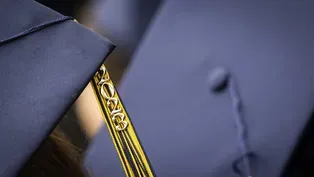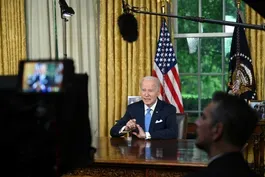
Why several states are pushing to relax child labor laws
Clip: 6/3/2023 | 7m 27sVideo has Closed Captions
Why several states are pushing to loosen child labor restrictions
The U.S. government found child labor violations involving over 3,800 minors in 2022. At the same time, some states say there is too much regulation of child labor. Katherine Walts, director of the Center for the Human Rights of Children at Loyola University Chicago, and Dan Bowling, a distinguished fellow at Duke University School of Law, join Ali Rogin to discuss the state of child labor laws.
Problems with Closed Captions? Closed Captioning Feedback
Problems with Closed Captions? Closed Captioning Feedback
Major corporate funding for the PBS News Hour is provided by BDO, BNSF, Consumer Cellular, American Cruise Lines, and Raymond James. Funding for the PBS NewsHour Weekend is provided by...

Why several states are pushing to relax child labor laws
Clip: 6/3/2023 | 7m 27sVideo has Closed Captions
The U.S. government found child labor violations involving over 3,800 minors in 2022. At the same time, some states say there is too much regulation of child labor. Katherine Walts, director of the Center for the Human Rights of Children at Loyola University Chicago, and Dan Bowling, a distinguished fellow at Duke University School of Law, join Ali Rogin to discuss the state of child labor laws.
Problems with Closed Captions? Closed Captioning Feedback
How to Watch PBS News Hour
PBS News Hour is available to stream on pbs.org and the free PBS App, available on iPhone, Apple TV, Android TV, Android smartphones, Amazon Fire TV, Amazon Fire Tablet, Roku, Samsung Smart TV, and Vizio.
Providing Support for PBS.org
Learn Moreabout PBS online sponsorshipLISA DESJARDINS: The economy has been high in the headlines, but less so has been news about the youngest workers.
Last year, the U.S. government found child labor violations involving more than 3,800 minors, one quarter involving hazardous working conditions.
Both figures are up from the previous fiscal year.
At the same time, a handful of states say they think there's too much regulation of child labor.
Ali Rogin has more.
ALI ROGIN: So far this year, Iowa and Arkansas have passed laws to loosen child labor restrictions, and four other Midwestern states are advancing bills through their legislatures.
Last year, New Jersey and New Hampshire signed bills to lower age restrictions around child workers.
Iowa's law is the most expansive, it would allow some minors to work in jobs that were previously prohibited to them, like those involving demolition and power driven machines.
The other bills largely focused on removing requirements for work permits, and increasing the number of hour's children can work.
To discuss the state of child labor laws I'm joined by Katherine Walts, Director of the Center for the Human Rights of Children at Loyola University of Chicago.
And Dan Bowling, a Distinguished Fellow at Duke University School of Law.
Thank you both so much for joining me.
Katherine, I want to start with you.
Why is it that these laws seem to be all making their way through state legislatures at the same time?
KATHERIN WALTS, Director, Center for the Human Rights of Children: Thank you for having me.
I find this very interesting, in light of the fact that there is also a parallel increase in child labor violations under the Department of Labor.
So I think this is certainly a coordinated effort by industry and by Republicans to try to weaken federal labor laws, particularly as it affects children.
There is a gap in labor, and people are looking for more people to hire.
And unfortunately, children are being thrown under the bus.
ALI ROGIN: And Katherine sticking with you.
A lot of the most egregious child labor violations that we've seen, as you mentioned, which have been increasing over the past two years, they would not really be impacted by these laws.
So, where then do you see the through line between the efforts by lawmakers and companies to loosen these restrictions and the child labor the increase in child labor violations that we've seen?
What's the connection there?
Well, I think there's like a couple of things.
I wouldn't agree with the characterization that these laws wouldn't affect, like the health of children.
Our child labor laws exist very intentionally and have been developed over decades, even over 100 years with the knowledge that children's brains and bodies are different children are not adults in miniature.
So recognizing that they're -- they are more vulnerable to toxins in the environment to cleaning supplies to longer work hours, to less sleep.
This affects their brains and bodies.
This also affects their ability to engage successfully in school and an education.
ALI ROGIN: And then there are federal laws on the books of child labor -- the child labor provisions of the Fair Labor Standards Act sets maximum hours for 14 and 15 year olds.
And in fact, some of these laws that have either passed or are being considered would run afoul of those federal regulations.
So what do you expect to happen there?
Are we going to see challenges to the state laws?
DAN BOWLING, Duke University School of Law: Right.
For example, two days ago, a federal court throughout a law or blocked application won the new state laws under what we call the preemption doctrine, meaning federal law, states can restrict child labor lawfully cannot expand child labor lawfully.
I agree with my colleague, Katherine on many points.
I disagree that there's some sort of consortium, big business.
Most of the violations I've been looking at when studying for this, were from what I'll call rogue actors or franchisees.
I was, as you may know, Chief HR officer for Coca Cola enterprises worldwide, and we had some rogue actors, it might send that signal to these rogue actors, that it's okay to do this till you get caught.
Because the fines are fairly minimal.
So that's one.
I don't think the laws will stand to the extent they loosened, like the one life at Wisconsin allows 14-year olds to serve alcohol.
And it's hard to imagine a 14 year old serving cocktail waitress and some hockey talk in Wisconsin.
So these won't stand.
But the signals they may send are, are bad ones.
ALI ROGIN: Katherine, if I can ask you quickly to respond to Dan's point about these being rogue actors as opposed to orchestrated larger attempts.
Would you like to weigh in on that?
KATHERIN WALTS: Sure, I think with any violations of any laws, you have both like rogue independent actors.
And then there are also larger systemic issues.
And I think with many of the recent child labor violations, these are violations that are happening across several states by large corporations.
I'm not saying youth and particularly adolescents shouldn't work.
These are jobs though, where they're expanding hours of work, hours outside of school that impact children's ability to sleep, ability to rest, and their low wage jobs, right, these are not high skilled jobs.
And they're also affecting and impacting children's access to school.
ALI ROGIN: Katherine, Dan brought up another point that I'd like you to weigh in on as well, which is about enforcement, that some lawmakers who have pursued these bills say that the existing Department of Labor regulations are simply not really being enforced.
KATHERIN WALTS: One of the reasons that the Department of Labor Wage and Hour Division isn't pursuing these cases is because it is one of the least funded governmental agencies, so it doesn't have the capacity to pursue these cases and the way that it should.
And so that is also, you know, a statement to look where our values are.
And just because they're not investigating these cases, or bringing them to the table doesn't mean that the act itself, these child labor violations isn't wrong, and isn't a crime and a law isn't being broken.
ALI ROGIN: And, Dan, there are efforts to revise the federal regulations on the books.
There's a bill from Congressman Dusty Johnson of South Dakota, which would expand working hours for children a year round, what's going to be the interplay that in between efforts on the federal level to change Department of Labor regulations, and what we're seeing on the state level?
DAN BOWLING: Well, I think the chances of that getting anywhere are about the chances of me being appointed Supreme Court tomorrow.
So, I'm not overly concerned about that.
But finally, again, the Department of Labor the fact they are finding more violations meaning they can they're doing their job.
ALI ROGIN: Katherine Walts and Dan Bowling, thank you so much for being here.
KATHERIN WALTS: Thank you so much.
DAN BOWLING: Thank you, Ali.
High school valedictorians share their hopes for the future
Video has Closed Captions
Clip: 6/3/2023 | 3m 28s | How does the future look? High school valedictorians share their hopes (3m 28s)
The next political battles heating up after the debt deal
Video has Closed Captions
Clip: 6/3/2023 | 6m 59s | What’s next after the debt limit deal for Congress and the presidential race (6m 59s)
Providing Support for PBS.org
Learn Moreabout PBS online sponsorshipSupport for PBS provided by:
Major corporate funding for the PBS News Hour is provided by BDO, BNSF, Consumer Cellular, American Cruise Lines, and Raymond James. Funding for the PBS NewsHour Weekend is provided by...












